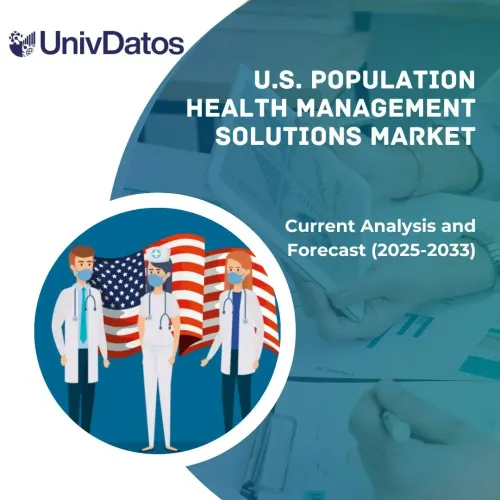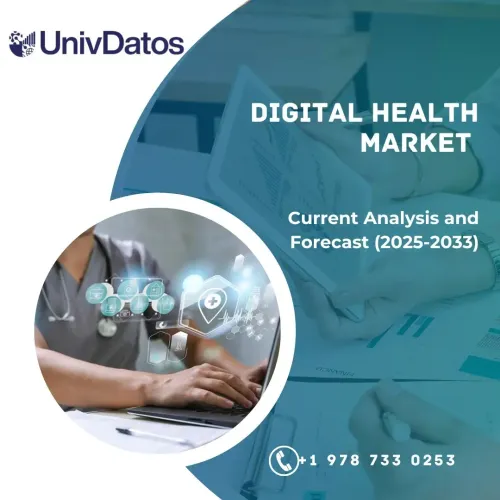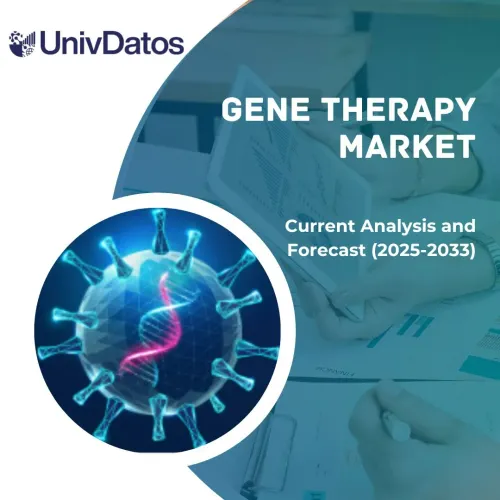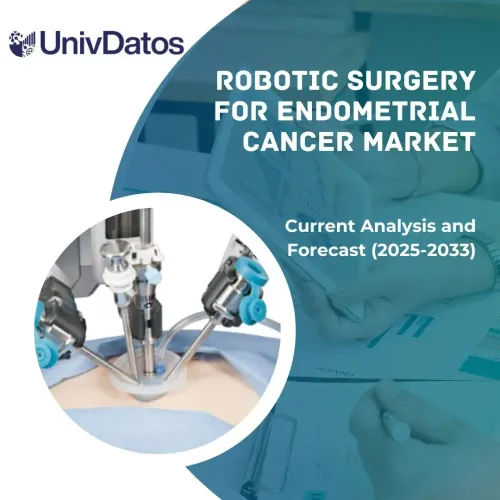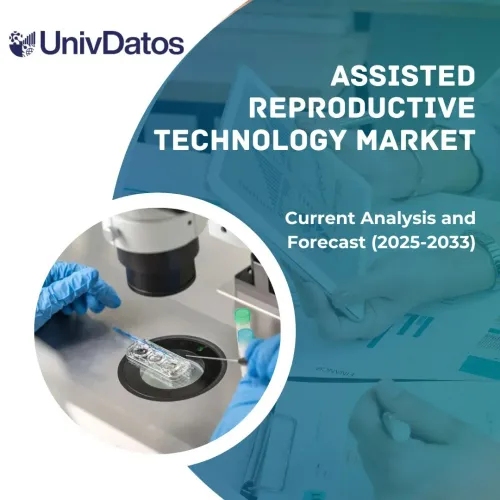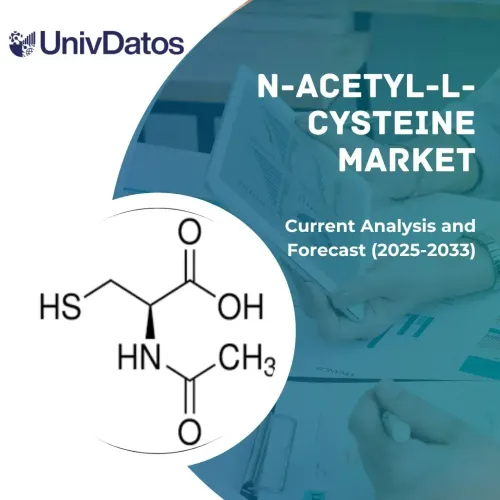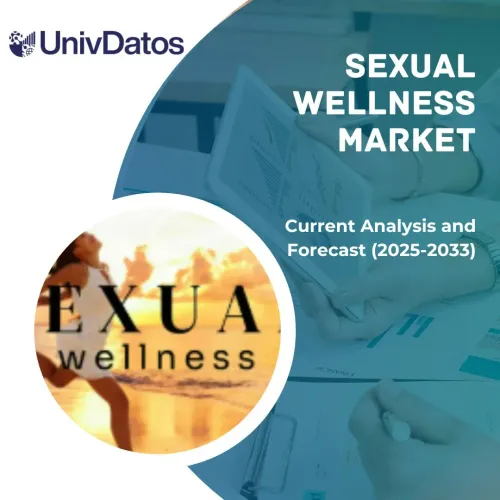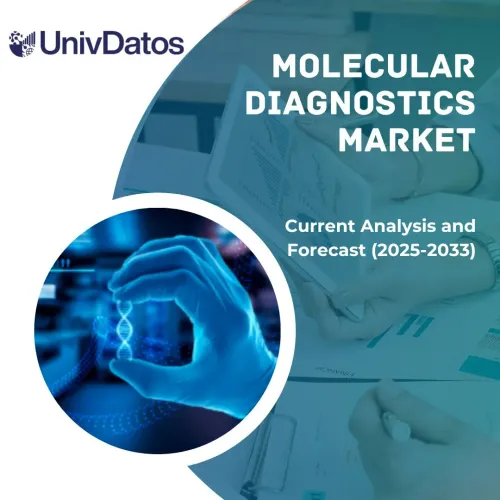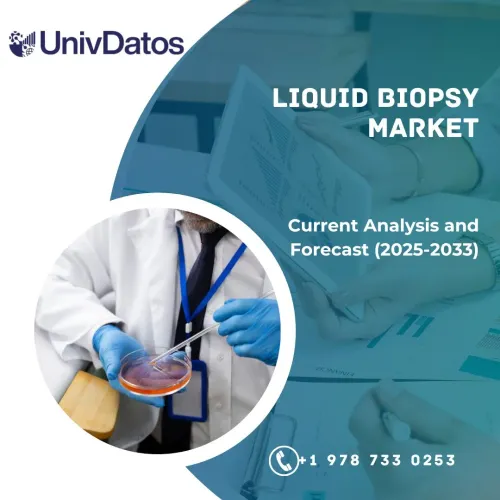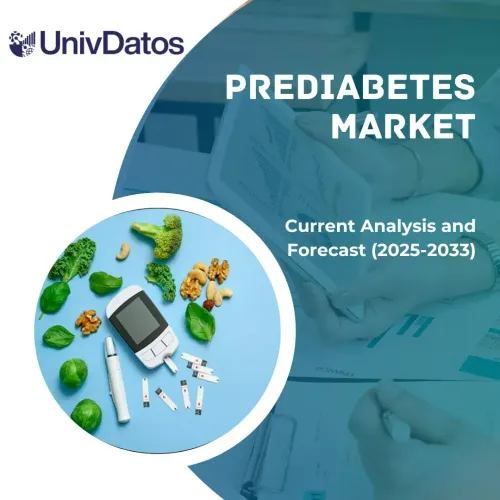- Home
- About Us
- Industry
- Services
- Reading
- Contact Us
Peptide and Anticoagulant Drugs Market: Current Analysis and Forecast (2022-2028)
Emphasis on Route of Administration ([Peptide Drugs {Parenteral, Oral, Mucosal, and Others}, Anticoagulant Drugs {Oral and Injectable}]); Application (Cancer, Metabolic, Cardiovascular Disorders, Pulmonary Embolism, Deep Vein Thrombosis, Atrial Fibrillation & Heart Attack, And Others); Distribution Channel (Hospital Pharmacies, Retail Pharmacies, and Online Pharmacies); and Region/Country
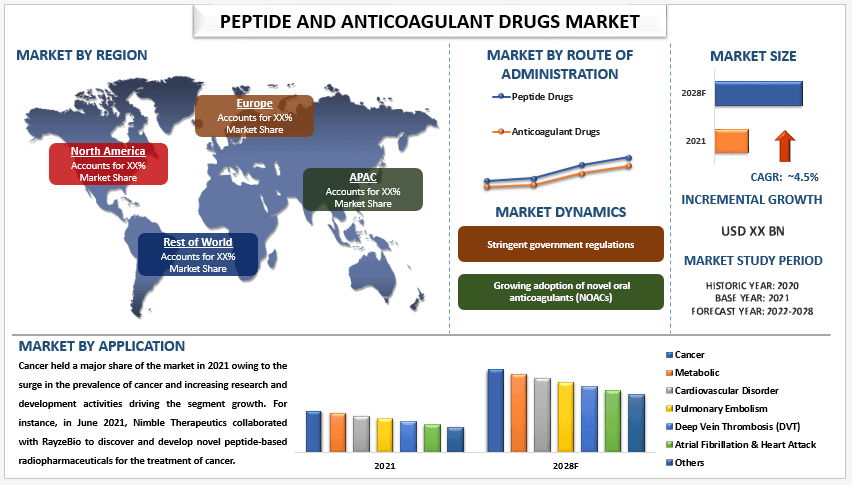
The peptide and anticoagulant drugs market was valued at USD 1,500 Million in 2021 and is expected to grow at a strong CAGR of around 4.5% during the forecast period (2022-2030) owing to the surge in the incidence of cancer, rising prevalence of various cardiovascular diseases, rising research and development activities for the development of novel peptide therapeutics, and the development of a novel pipeline of drugs. Moreover, chronic diseases like diabetes and cardiovascular diseases are the foremost causes of morbidity and mortality worldwide, as per the World Health Organization (WHO). Chronic disease rates have skyrocketed globally, advancing across all regions and affecting all socioeconomic classes. Chronic diseases were estimated to cause 73 percent of all deaths and 60 percent of the global disease burden in 2020. As a result, the rising prevalence of chronic diseases increases the demand for effective therapeutics, which is anticipated to drive the market. Moreover, this along with the rapid increase in the number of cases of atrial fibrillation and heart attacks across the globe is driving the market. As per the Centers for Disease Control and Prevention, about 12.1 million people in the United States have atrial fibrillation by 2030. In 2019, atrial fibrillation was reported for 26,535 deaths. Also, in 2019, 17.9 million people died from cardiovascular diseases. Of these deaths, 85% were due to heart attack and stroke, as per the World Health Organization. Furthermore, the technological development and introduction of new peptide therapeutics for treating chronic diseases like cancer are also fueling the growth of the studied market. For instance, in May 2021, ISSAR Pharmaceuticals decided to license its peptide-based new NCEs with pre-IND filing. Thus, the above-mentioned factors are driving the growth of the market in the coming years.
Some of the major players operating in the market include AbbVie Inc.; F. Hoffmann-La Roche Ltd; Amgen Inc.; Pfizer Inc.; Bristol-Myers Squibb Company; Lilly; Sanofi; GSK plc; Novartis AG; and Takeda Pharmaceutical Company Limited. Several M&As along with partnerships have been undertaken by these players to facilitate customers with hi-tech and innovative products/technologies.
Insights Presented in the Report
“Amongst application, the metabolic segment held a significant share of the market in 2021”
Based on application, the market is segmented into cancer, metabolic, cardiovascular disorders, pulmonary embolism, deep vein thrombosis, atrial fibrillation & heart attack, and others. As per our analysis, the metabolic segment held a significant share of the market in 2021. The rising geriatric population and the associated surge in the prevalence of metabolic disorders are major factors contributing to segment growth. Gaucher disease (GD) is an autosomal recessive lysosomal storage disorder characterized by progressive glucocerebroside storage in macrophages, predominantly in bone, bone marrow, liver, and spleen. In July 2022, an article published in the journal JPHO asserted that the prevalence of GD in global birth was 1.5 cases per 100,000 live births. The overall global prevalence of GD was 0.9 cases per 100,000 inhabitants. The high prevalence of such metabolic disorders is fueling the demand for peptide therapeutics for treating metabolic disorders, thereby driving the growth of the studied market.
“Amongst technology, the injectable segment is expected to grow at a significant CAGR during the forecast period”
By route of administration, the market is segmented into peptide drugs which are sub-segmented into parental, mucosal, oral, and transdermal, and anticoagulant drugs sub-segmented into oral and injectable. Among these, the injectable segment is expected to grow at a significant CAGR during the forecast period. The growth of this segment is because more patients prefer injectable anticoagulants currently. Some of the commonly used injectable anticoagulants are low molecular-weight heparin, lepirudin, and danaparoid, among others. However, the oral segment is also expected to grow with a lucrative CAGR during the forecast period.
“APAC to grow with high CAGR during the forecast period”
APAC is expected to grow with significant CAGR during the forecast period due to untapped opportunities, low cost for raw materials, a large number of companies offering outsourcing services, a thriving biotech industry, and rising research and development activities. For instance, in December 2022, PeptiDream announced a collaboration with Eli Lilly for the discovery of novel peptide drug conjugates. Under the agreement, PeptiDream will provide peptide candidates identified from PeptiDream’s proprietary Peptide Discovery Platform System (PDPS) technology for use as PDCs against targets of interest to Merck. Moreover, the rising prevalence of cardiovascular disease, increased awareness and understanding of the benefits of anticoagulant therapy, and an aging population will drive the Asia pacific region.
Peptide and Anticoagulant Drugs Market Report Coverage
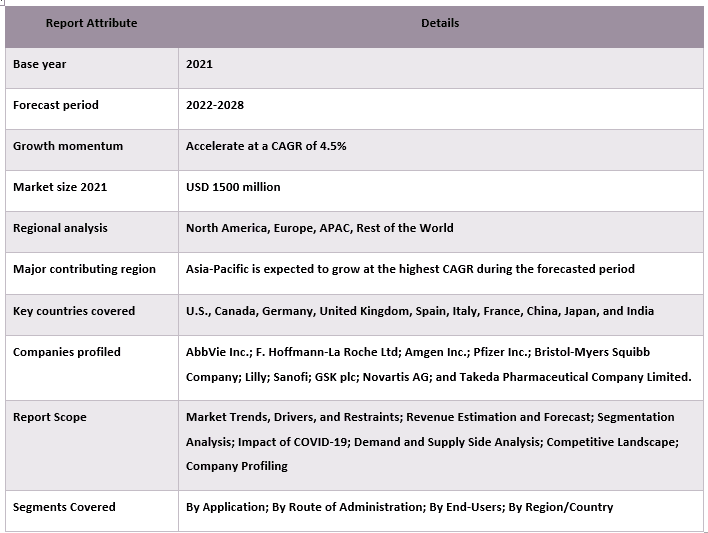
Reasons to buy this report:
- The study includes market sizing and forecasting analysis validated by authenticated key industry experts.
- The report presents a quick review of overall industry performance at one glance.
- The report covers an in-depth analysis of prominent industry peers with a primary focus on key business financials, product portfolios, expansion strategies, and recent developments.
- Detailed examination of drivers, restraints, key trends, and opportunities prevailing in the industry.
- The study comprehensively covers the market across different segments.
- Deep dive regional level analysis of the industry.
Customization Options:
The global peptide and anticoagulant drugs market can further be customized as per the requirement or any other market segment. Besides this, UMI understands that you may have your own business needs, hence feel free to connect with us to get a report that completely suits your requirements.
Table of Content
Research Methodology for the Peptide and Anticoagulant Drugs Market Analysis (2022-2028)
Analyzing the historical market, estimating the current market, and forecasting the future market of the global peptide and anticoagulant drugs market were the three major steps undertaken to create and analyze the adoption of peptide and anticoagulant drugs in major regions globally. Exhaustive secondary research was conducted to collect the historical market numbers and estimate the current market size. Secondly, to validate these insights, numerous findings and assumptions were taken into consideration. Moreover, exhaustive primary interviews were also conducted, with industry experts across the value chain of the global peptide and anticoagulant drugs market. Post assumption and validation of market numbers through primary interviews, we employed a top-down/bottom-up approach to forecasting the complete market size. Thereafter, market breakdown and data triangulation methods were adopted to estimate and analyze the market size of segments and sub-segments of the industry pertains to. Detailed methodology is explained below:
Analysis of Historical Market Size
Step 1: In-Depth Study of Secondary Sources:
Detail secondary study was conducted to obtain the historical market size of the peptide and anticoagulant drugs market through company internal sources such as annual reports & financial statements, performance presentations, press releases, etc., and external sources including journals, news & articles, government publications, competitor publications, sector reports, third-party database, and other credible publications.
Step 2: Market Segmentation:
After obtaining the historical market size of the peptide and anticoagulant drugs market, we conducted a detailed secondary analysis to gather historical market insights and share for different segments & sub-segments for major regions. Major segments are included in the report as application, route of administration, and distribution channel. Further country-level analyses were conducted to evaluate the overall adoption of testing models in that region.
Step 3: Factor Analysis:
After acquiring the historical market size of different segments and sub-segments, we conducted a detailed factor analysis to estimate the current market size of the peptide and anticoagulant drugs market. Further, we conducted factor analysis using dependent and independent variables such as application, route of administration, and distribution channel of the peptide and anticoagulant drugs market. A thorough analysis was conducted for demand and supply-side scenarios considering top partnerships, mergers and acquisitions, business expansion, and product launches in the peptide and anticoagulant drugs market sector across the globe.
Current Market Size Estimate & Forecast
Current Market Sizing: Based on actionable insights from the above 3 steps, we arrived at the current market size, key players in the global peptide and anticoagulant drugs market, and market shares of the segments. All the required percentage shares split, and market breakdowns were determined using the above-mentioned secondary approach and were verified through primary interviews.
Estimation & Forecasting: For market estimation and forecast, weights were assigned to different factors including drivers & trends, restraints, and opportunities available for the stakeholders. After analyzing these factors, relevant forecasting techniques i.e., the top-down/bottom-up approach were applied to arrive at the market forecast for 2028 for different segments and sub-segments across the major markets globally. The research methodology adopted to estimate the market size encompasses:
- The industry’s market size, in terms of revenue (USD) and the adoption rate of the peptide and anticoagulant drugs market across the major markets domestically
- All percentage shares, splits, and breakdowns of market segments and sub-segments
- Key players in the global peptide and anticoagulant drugs market in terms of products offered. Also, the growth strategies adopted by these players to compete in the fast-growing market
Market Size and Share Validation
Primary Research: In-depth interviews were conducted with the Key Opinion Leaders (KOLs) including Top Level Executives (CXO/VPs, Sales Head, Marketing Head, Operational Head, Regional Head, Country Head, etc.) across major regions. Primary research findings were then summarized, and statistical analysis was performed to prove the stated hypothesis. Inputs from primary research were consolidated with secondary findings, hence turning information into actionable insights.
Split of Primary Participants in Different Regions

Market Engineering
The data triangulation technique was employed to complete the overall market estimation and to arrive at precise statistical numbers for each segment and sub-segment of the global peptide and anticoagulant drugs market. data was split into several segments & sub-segments post studying various parameters and trends in the areas of the application, route of administration, and distribution channel in the global peptide and anticoagulant drugs market.
The main objective of the Global Peptide and anticoagulant drugs Market Study
The current & future market trends of the global peptide and anticoagulant drugs market were pinpointed in the study. Investors can gain strategic insights to base their discretion for investments on the qualitative and quantitative analysis performed in the study. Current and future market trends determined the overall attractiveness of the market at a regional level, providing a platform for the industrial participant to exploit the untapped market to benefit from a first-mover advantage. Other quantitative goals of the studies include:
- Analyze the current and forecast market size of the peptide and anticoagulant drugs market in terms of value (USD). Also, analyze the current and forecast market size of different segments and sub-segments
- Segments in the study include areas of the application, route of administration, distribution channel
- Define and analysis of the regulatory framework for the peptide and anticoagulant drugs industry
- Analyze the value chain involved with the presence of various intermediaries, along with analyzing customer and competitor behaviors of the industry
- Analyze the current and forecast market size of the peptide and anticoagulant drugs market for the major region
- Major countries of regions studied in the report include Asia Pacific, Europe, North America, and the Rest of the World
- Company profiles of the peptide and anticoagulant drugs market and the growth strategies adopted by the market players to sustain in the fast-growing market
- Deep dive regional level analysis of the industry
Related Reports
Customers who bought this item also bought

